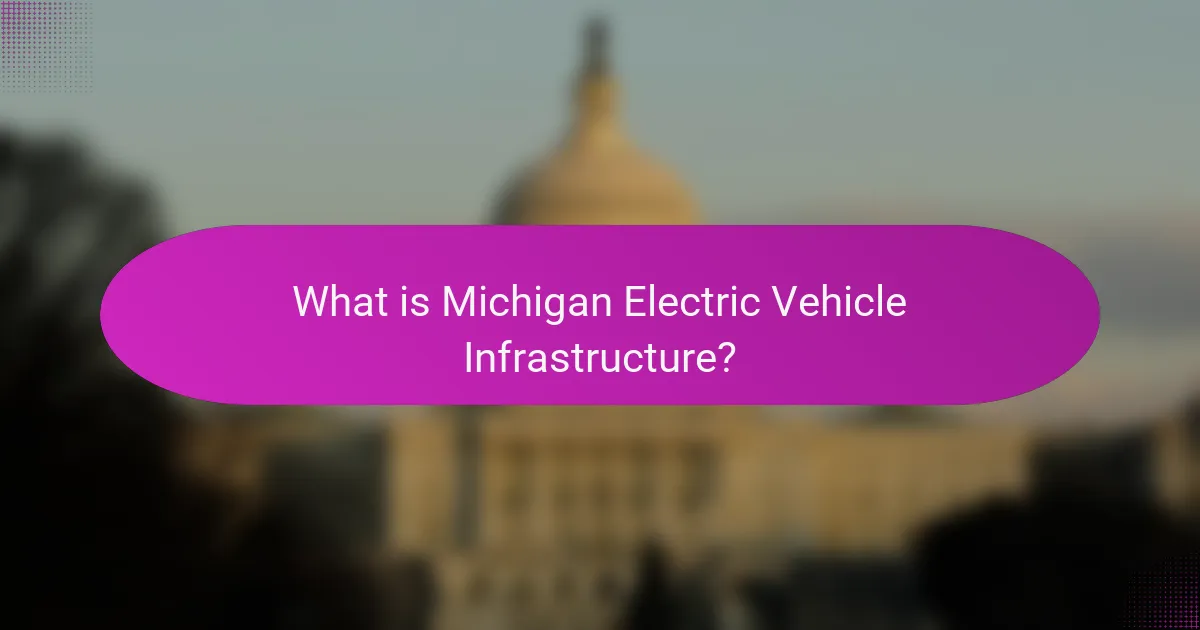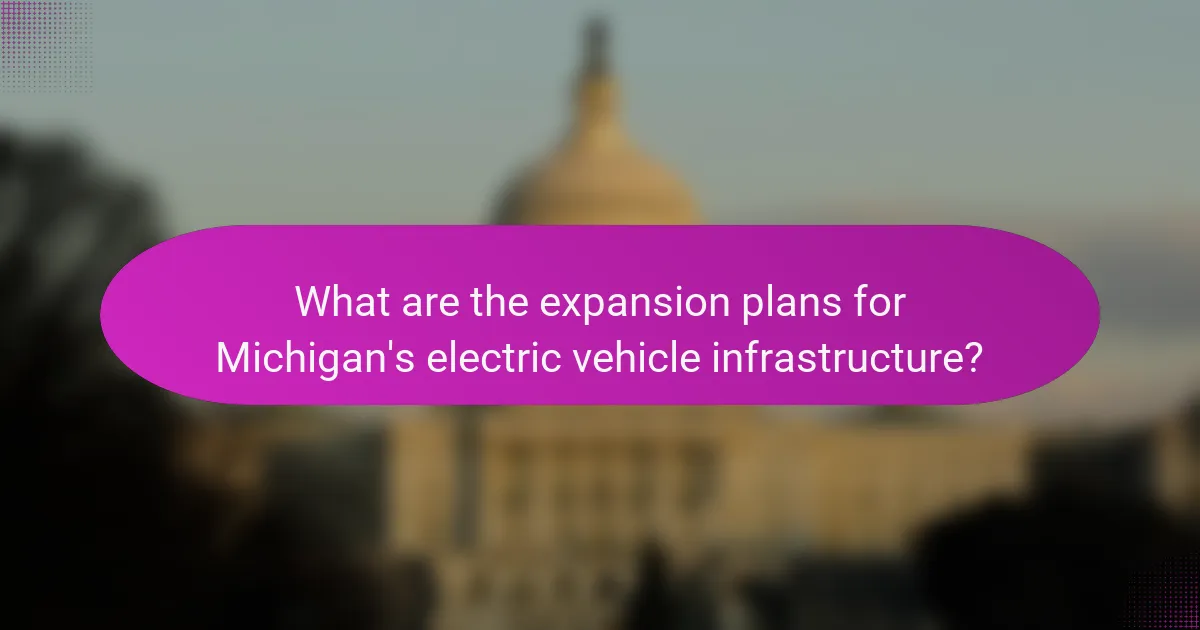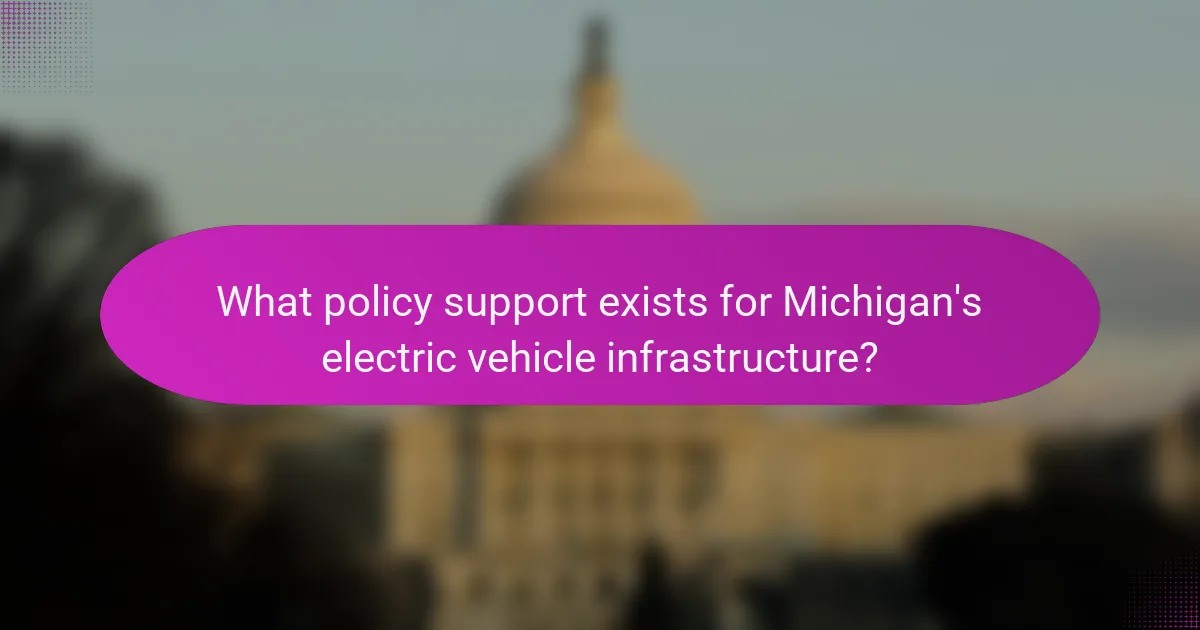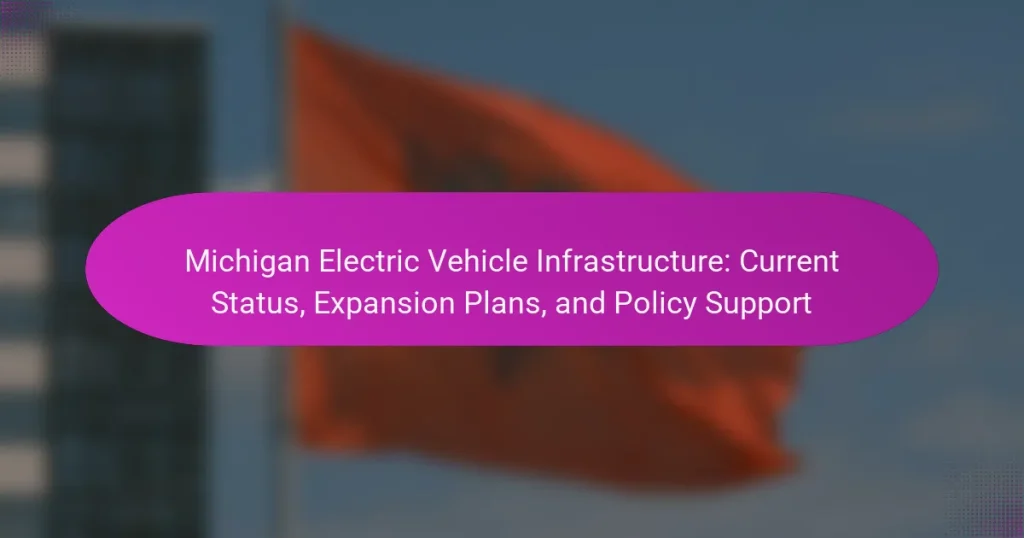
What is Michigan Electric Vehicle Infrastructure?
Michigan Electric Vehicle Infrastructure refers to the network of charging stations and related facilities that support electric vehicle use in Michigan. This infrastructure includes public and private charging stations, fast chargers, and home charging solutions. As of 2023, Michigan has over 1,000 public charging stations available, with plans for further expansion. The state aims to enhance accessibility and convenience for electric vehicle owners. Investments are being made to increase the number of charging locations, especially along major highways. Additionally, state policies are promoting the development of this infrastructure to meet growing electric vehicle adoption.
How does Michigan’s electric vehicle infrastructure function?
Michigan’s electric vehicle infrastructure functions through a network of charging stations and state policies promoting EV adoption. The state has over 2,000 public charging stations available for electric vehicles. These stations are strategically placed along highways and in urban areas to ensure accessibility. Michigan’s government supports this infrastructure through incentives for installation and usage. Additionally, partnerships with private companies enhance charging options. The state’s commitment includes a goal to have 1 million EVs on the road by 2030. This infrastructure is crucial for reducing greenhouse gas emissions and promoting sustainable transportation.
What are the key components of this infrastructure?
The key components of Michigan’s electric vehicle infrastructure include charging stations, power supply networks, and regulatory frameworks. Charging stations are essential for providing access to electric vehicle users. They are strategically located across urban and rural areas to ensure convenience. Power supply networks support the charging stations by delivering electricity from renewable and non-renewable sources. Regulatory frameworks establish guidelines for installation and operation of charging infrastructure. These components work together to facilitate the growth of electric vehicle usage in Michigan.
How do these components support electric vehicle adoption?
The components of Michigan’s electric vehicle infrastructure support adoption by enhancing accessibility and convenience for users. Charging stations provide necessary infrastructure for electric vehicle owners, reducing range anxiety. Incentives and rebates lower financial barriers, making electric vehicles more affordable. Policy support fosters a favorable regulatory environment, encouraging investment in electric vehicle technology. Research indicates that robust infrastructure correlates with increased electric vehicle sales. For instance, a study by the International Council on Clean Transportation found that regions with more charging stations see higher adoption rates.
What is the current status of electric vehicle infrastructure in Michigan?
The current status of electric vehicle infrastructure in Michigan is rapidly evolving. As of 2023, Michigan has over 2,000 public charging stations available. These stations are strategically located to support the growing number of electric vehicles on the road. The state government has initiated various programs to expand this infrastructure. For instance, the Michigan Electric Vehicle Infrastructure Grant Program allocates funds to enhance charging networks. Additionally, several major automakers are investing in their own charging stations. This collaborative effort aims to meet the increasing demand for electric vehicle charging. Overall, Michigan’s electric vehicle infrastructure is expanding to support a cleaner transportation future.
How many charging stations are currently available?
As of October 2023, there are approximately 2,000 public charging stations available in Michigan. This number reflects the state’s ongoing efforts to expand electric vehicle infrastructure. The availability of charging stations is crucial for supporting the growing number of electric vehicles on the road. Michigan’s investment in this infrastructure aims to promote sustainable transportation options.
What regions in Michigan have the most developed infrastructure?
Southeast Michigan has the most developed infrastructure. This region includes cities like Detroit and Ann Arbor. It boasts extensive road networks and public transportation systems. Additionally, Southeast Michigan is a hub for electric vehicle (EV) infrastructure. The area has numerous charging stations and support from local policies. According to the Michigan Department of Transportation, this region leads in EV adoption and infrastructure development.
What are the benefits of a robust electric vehicle infrastructure?
A robust electric vehicle infrastructure enhances accessibility and convenience for EV users. It increases the number of charging stations, making it easier for drivers to recharge their vehicles. This infrastructure supports longer travel distances by reducing range anxiety. It encourages more consumers to adopt electric vehicles, contributing to lower greenhouse gas emissions. A well-developed network can stimulate local economies by creating jobs in installation and maintenance. Studies show that regions with extensive EV infrastructure experience higher EV adoption rates. For instance, California’s extensive charging network has led to a significant increase in electric vehicle sales. Overall, a strong electric vehicle infrastructure is crucial for promoting sustainable transportation solutions.
How does it impact environmental sustainability?
The expansion of electric vehicle (EV) infrastructure in Michigan positively impacts environmental sustainability. Increased EV usage reduces greenhouse gas emissions compared to traditional gasoline vehicles. The Michigan Department of Environment, Great Lakes, and Energy reports that electric vehicles produce significantly lower emissions over their lifetime. Furthermore, the transition to EVs supports the state’s goal of reducing carbon emissions by 28% by 2025. Enhanced charging infrastructure encourages more consumers to adopt electric vehicles, further decreasing reliance on fossil fuels. This shift contributes to cleaner air quality and mitigates climate change effects.
What economic advantages does it offer to Michigan?
The electric vehicle infrastructure offers significant economic advantages to Michigan. It promotes job creation in manufacturing and installation of EV components. The expansion of charging stations stimulates local businesses and increases tourism. Investment in EV technology attracts research and development funding. Michigan can enhance its position as a leader in the automotive industry. The transition to electric vehicles reduces long-term fuel costs for consumers. Additionally, it contributes to environmental sustainability, which can attract eco-conscious businesses. Overall, these factors drive economic growth and innovation within the state.

What are the expansion plans for Michigan’s electric vehicle infrastructure?
Michigan plans to expand its electric vehicle infrastructure significantly. The state aims to increase the number of public charging stations. This expansion includes both fast and standard charging options. Michigan’s goal is to have 2,500 charging stations by 2025. The state is also investing in incentives for businesses to install chargers. This initiative supports the transition to electric vehicles. Additionally, partnerships with private companies are being formed. These efforts are part of a broader strategy to reduce greenhouse gas emissions.
What initiatives are being implemented for future expansion?
Michigan is implementing several initiatives for future expansion of its electric vehicle infrastructure. The state is investing in the development of additional charging stations to enhance accessibility. Plans include increasing the number of fast-charging locations along major highways. This initiative aims to support long-distance travel for electric vehicle users. Furthermore, Michigan is collaborating with private companies to improve charging technology and infrastructure. The state government is also providing incentives for businesses to install charging stations. These efforts are part of a broader strategy to meet the growing demand for electric vehicles. The goal is to create a comprehensive network that supports the state’s climate and transportation goals.
Which areas are prioritized for new charging stations?
Urban areas and major highways in Michigan are prioritized for new charging stations. These locations are chosen due to high traffic volumes and population density. Cities like Detroit, Ann Arbor, and Grand Rapids have significant demand for electric vehicle infrastructure. Additionally, key corridors connecting these urban centers are also targeted. The Michigan Department of Transportation has identified these areas based on electric vehicle adoption rates. This strategic placement aims to enhance accessibility and convenience for electric vehicle users.
What technologies are being integrated into expansion plans?
Electric vehicle (EV) charging technologies are being integrated into expansion plans in Michigan. These include fast-charging stations to reduce charging time significantly. Smart grid technology is also part of the plans, enabling better energy management. Additionally, wireless charging infrastructure is being explored for convenience. Vehicle-to-grid (V2G) technology will allow EVs to supply energy back to the grid. Renewable energy integration is prioritized to enhance sustainability. These technologies support Michigan’s goal of expanding its EV infrastructure effectively.
How will funding for expansion be secured?
Funding for expansion will be secured through a combination of federal grants, state incentives, and private investments. The federal government has allocated significant funds for electric vehicle infrastructure under the Infrastructure Investment and Jobs Act. Michigan’s state government also offers incentives to encourage the development of EV charging stations. Additionally, partnerships with private companies will provide necessary capital for expansion projects. These funding sources are crucial for meeting the growing demand for electric vehicle infrastructure in Michigan.
What government grants or incentives are available?
The Michigan government offers several grants and incentives for electric vehicle infrastructure. These include the Michigan Electric Vehicle Infrastructure Grant Program. This program provides funding for the installation of charging stations. Grants can cover up to 50% of the project costs. Additionally, the state offers tax credits for businesses that install EV charging infrastructure. These incentives aim to promote the adoption of electric vehicles. According to the Michigan Department of Environment, Great Lakes, and Energy, these initiatives support the state’s clean energy goals.
How are private partnerships contributing to expansion efforts?
Private partnerships are significantly contributing to expansion efforts in Michigan’s electric vehicle infrastructure. These collaborations leverage resources and expertise from both the public and private sectors. For instance, private companies invest in charging station installations, increasing accessibility for EV users. Additionally, partnerships facilitate technology sharing, enhancing the efficiency of infrastructure development. Data from the Michigan Department of Transportation indicates that such collaborations have led to a 30% increase in charging stations over the past year. Moreover, these partnerships often attract federal and state funding, further accelerating expansion initiatives.

What policy support exists for Michigan’s electric vehicle infrastructure?
Michigan’s electric vehicle infrastructure is supported by various state policies and initiatives. The Michigan Electric Vehicle Infrastructure Grant Program provides funding for charging stations. This program aims to enhance the availability of electric vehicle charging across the state. Additionally, Governor Gretchen Whitmer’s administration has set ambitious goals for electric vehicle adoption. The state aims to have 1 million electric vehicles on the road by 2030. Moreover, Michigan has implemented incentives for consumers purchasing electric vehicles. These incentives include tax credits and rebates. The Michigan Economic Development Corporation also plays a role in promoting electric vehicle technology development. Overall, these policies collectively foster a supportive environment for electric vehicle infrastructure in Michigan.
What state policies are currently in place to support electric vehicles?
Michigan has implemented several state policies to support electric vehicles (EVs). The state offers incentives such as tax credits for EV purchases. Additionally, Michigan provides funding for EV charging infrastructure through grants. The state aims to increase the number of public charging stations. Michigan has set ambitious goals for EV adoption, targeting 1 million EVs by 2030. The Clean Michigan Initiative supports clean energy projects, including EV technology. Furthermore, the state collaborates with automakers to enhance EV production. These policies are part of Michigan’s broader commitment to sustainable transportation and reducing emissions.
How do these policies encourage infrastructure development?
Policies encourage infrastructure development by providing financial incentives and regulatory support. These measures lower the costs associated with building electric vehicle (EV) charging stations. For instance, grants and subsidies can cover a significant portion of installation expenses. Additionally, streamlined permitting processes reduce delays in deployment.
Regulatory frameworks that mandate EV infrastructure in new developments further stimulate growth. These policies create a predictable environment for investors and developers. As a result, private sector participation increases, leading to more rapid infrastructure expansion.
Data from the Michigan Department of Transportation indicates that these policies have led to a marked increase in charging station installations statewide. The number of public charging stations in Michigan has grown significantly in recent years due to such supportive measures.
What role does local government play in policy support?
Local government plays a critical role in policy support for electric vehicle infrastructure. They facilitate the implementation of state and federal policies at the community level. Local governments often create zoning laws that permit the installation of charging stations. They also provide incentives for businesses and residents to adopt electric vehicles. Additionally, local governments can secure funding for infrastructure projects through grants and partnerships. According to the Michigan Department of Environment, Great Lakes, and Energy, local governments are key in advancing clean energy initiatives. Their involvement ensures that policies align with community needs and priorities. This local engagement helps to promote sustainable transportation options effectively.
What future policies are being proposed to enhance infrastructure?
Future policies proposed to enhance infrastructure in Michigan focus on expanding electric vehicle (EV) charging networks. The Michigan Department of Transportation plans to increase the number of charging stations across the state. This initiative aims to support the growing adoption of electric vehicles. Policies include funding for new charging infrastructure through state and federal grants. Additionally, there is an emphasis on ensuring accessibility in rural areas. The state is also considering incentives for private investments in EV infrastructure. These efforts align with national goals for reducing carbon emissions and promoting sustainable transportation.
How could these policies impact electric vehicle adoption rates?
Policies can significantly impact electric vehicle adoption rates. Incentives like tax credits lower the cost of electric vehicles for consumers. Research shows that states with such incentives see higher adoption rates. For example, California’s rebate program has led to over 600,000 electric vehicles on the road. Infrastructure investments, such as charging stations, also facilitate easier access to electric vehicles. Studies indicate that increased charging infrastructure correlates with higher electric vehicle sales. Furthermore, regulatory measures, like emissions standards, push manufacturers to produce more electric models. This combination of financial incentives, infrastructure development, and regulatory support creates a favorable environment for electric vehicle adoption.
What challenges might arise in implementing new policies?
Challenges in implementing new policies for Michigan’s electric vehicle infrastructure include funding shortages, regulatory hurdles, and public resistance. Funding shortages can limit the resources available for infrastructure development. Regulatory hurdles may arise from existing laws that complicate the adoption of new policies. Public resistance can manifest through concerns about costs or changes to local environments. Additionally, coordination among various stakeholders, such as government agencies and private companies, can be difficult. These challenges can delay project timelines and increase overall costs.
What best practices can be adopted for effective infrastructure development?
Effective infrastructure development can be achieved by adopting several best practices. First, stakeholder engagement is crucial. Involving local communities, businesses, and government entities ensures that diverse needs are met. Second, comprehensive planning is essential. This includes assessing current infrastructure and forecasting future demands. Third, utilizing sustainable materials and technologies can enhance durability and reduce environmental impact. Fourth, implementing phased development allows for adjustments based on performance and community feedback. Fifth, securing adequate funding through public-private partnerships can provide necessary resources. Lastly, establishing clear performance metrics helps in evaluating the effectiveness of infrastructure projects. These practices foster efficiency, sustainability, and community support in infrastructure development.
Michigan Electric Vehicle Infrastructure encompasses the network of charging stations and facilities that support electric vehicle use across the state. As of 2023, Michigan has over 2,000 public charging stations, with ongoing expansion plans aimed at increasing accessibility and convenience for electric vehicle owners. This infrastructure is bolstered by state policies and initiatives promoting electric vehicle adoption, including financial incentives and partnerships with private companies. The article will cover the current status of Michigan’s electric vehicle infrastructure, its key components, expansion plans, and the policy support driving its development.


